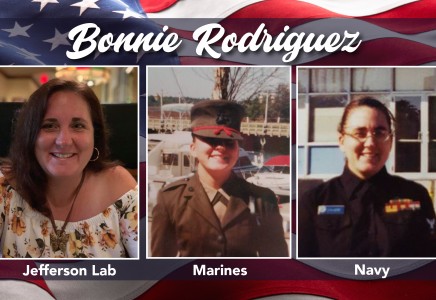Bonnie Rodriguez served as an Aviation Electrician in the Marines from 1993 to 1997, a Corpsman in the Navy Reserves from 1997 to 1999, and as a Communications Technician and Instructor in the Navy from 1999 to 2004. She started her career at Jefferson Lab in 2020 and now works as the Electrical Safety Coordinator for the ES&H Division.
“I learned serious critical thinking skills in the military. Having that critical eye is a necessity for a role in safety,” said Rodriguez.
Bonnie Rodriguez – Electrical Safety Coordinator at Jefferson Lab
Marines – 1993-1997
Navy Reserves – 1997-1999
Navy – 1999-2004
Growing up in San Diego, Bonnie Rodriguez would hear Marine Corps artillery fire during training at Fort Pendleton. She remembered that the sound was so intense it would shake the chandeliers in her home. She was no stranger to the military; in fact, her father and uncle both served in the Marines. Furthermore, she remembers that she felt as though her entire community were either in the Marines or Navy.
As a young college student, Rodriguez describes herself as a tad mischievous, with an occasional knack for getting into a little trouble. At the age of 18, she made the decision to join the military and march down a different road. The familiarity of it all cemented her choice to join the Marines.
“I had an ultimate sense of pride when I put on the uniform,” Rodriguez recalls. “My younger family members looked up to me. For me, it was a feeling that I was doing something right for the first time and my family was so proud of me.”
They had many reasons to be proud of her and for Rodriguez, the sky was the limit. She trained to be an Aviation Electrician and quickly excelled in the role. During this time, she went to nursing school and finished her enlistment four years later. She transferred to the Navy Reserves to be a Corpsman. This was her favorite role in the military because it allowed her to be at home with her family, but also challenged her because the position was never stagnant and she was always learning new things. Several years later, she used the electrician skills she learned in the Marines and joined the Navy to serve as a Communications Technician and Instructor. During this time, she was once even asked to join the Presidential Communications team, but had to decline because she was pregnant with her last daughter.
There were many firsts during Rodriguez’s time in the military, but one moment that stands out to her is that she was part of the first group of women to ever serve on the US Essex LHD2 ship in Sasebo, Japan.
“I learned the ship inside and out and it was big! That said, right around Guam, my appendix burst and so I ended up missing most of the deployment,” Rodriguez laughs.
Her time in the military served her well and she applied her knowledge in the civilian sector as an instructor in teaching positions, including a STEM program which she managed.
“I learned serious critical thinking skills in the military. Having that critical eye is a necessity for a role in safety,” she adds.
In her new role at Jefferson Lab, Rodriguez serves as the Electrical Safety Coordinator for the ES&H Division, where she will use her 25 years of experience in electronics and electrical safety to focus on adhering to strict electrical safety standards.
Thank you for your service, Bonnie Rodriguez!
By Rebecca Duckett
The regional home of Jefferson Lab, Hampton Roads, has a rich military history. Located in Southeastern Virginia, the region is currently home to more than 80,000 men and women in uniform, representing every branch of the armed forces. Throughout November 2020, Jefferson Lab is celebrating the region's military ties by highlighting some of our veteran employees who have served in the armed forces and who continue to serve their nation by supporting the research efforts carried out at the laboratory.


